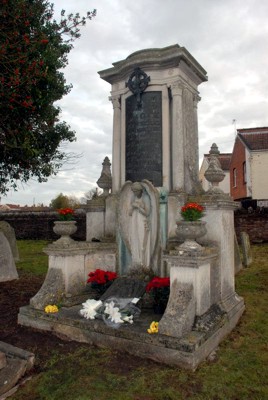Centenary Service for the James Cook Monument Thursday 1st December 2011
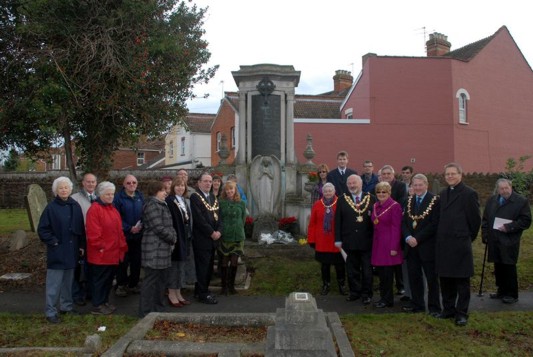
Attending the event were a number of Civic Dignitaries representing several different bodies which James Cook had an influence upon. These included:
The Mayor and Mayoress of Bridgwater Cllr. Pat and Jennie Parker
The Mayor and Mayoress of Taunton Cllr. Steve and Diana Brooks
The Mayor and Mayoress of Weston-super-Mare Cllr. Cyril and Sue King
The Chairwoman of Sedgemoor District Council Cllr. Gill Slocombe
The Vicar of St. Mary's Church Bridgwater, the Reverend Charles Chadwick
The Town Clerk of Bridgwater, Mr Alan Hurford
Decedents of the Cook Family, Mrs Gillian Hefferland and
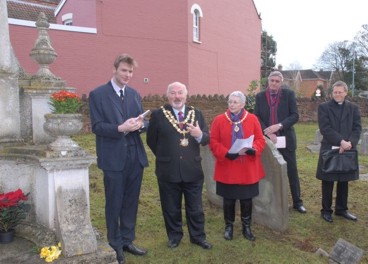
The chairman of the Friends of the Wembdon Road Cemetery welcomed those gathered and invited the Mayoress of Bridgwater to say a few words.
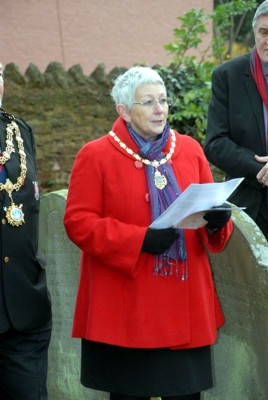
Speech by The Mayoress, Mrs. Jennie Parker:
One of the most remarkable things about the man we are commemorating today is neatly summarised as: 'The man who didn't have to'. This man, James Cook, could have led a quiet and enclosed life, working as a solicitor and retreating at night to his domestic sanctuary of hearth and home. There was no pressing need for him to do many of the things he did, little obvious gain, little material gain. Yet he did and we have much to thank him for.
It seems almost fitting that a man raised in a police station would pursue a career in the law. He could have been a moderate and unremarkable solicitor, like so many who fill the annals of history, but he seems to have been hard working, devoted and furnished with ability. His legal practice with Mr. Reed was considerable and extensive, above all successful, and he was highly sought after. He was triumphant in a number of high profile cases and we even known to win cases within ten minutes of the start of proceedings. He was professional, he knew his business and he knew the hard work needed for success. But we are not here today to commemorate a lawyer. There are many good lawyers who go unnoticed, but we are here today to commemorate what this man did for us. And he did much for Taunton, Weston-Super-Mare and Bridgwater.
In our county town his firm had a popular branch office, so popular in fact that the number of clients there far exceeded those of Bridgwater where the company was based. But for Taunton Cook seems to have been crucial as manager of the case for municipal incorporation of the town in 1877, the previous charter having lapsed as long ago as 1792. By this effort Cook helped Taunton re-establish the municipality of Taunton and he is often described as having been essential for this campaign. In his Will he also left a staggering amount of money for the time, something like £12000, to the hospital of Taunton. The town was clearly a place he felt fondly of.
For our illustrious sea-side town Cook resided for his last years. Suffering from paralysis and severe ill health he retreated to be by the sea for rest and recuperation. Even though at this late stage of his life and officially retired he still couldn't help himself but try and improve the town around him. He became a member of Weston's Urban District Council and chaired school boards and sat as a manager of the Science and Art school. In his later years he was a frequent sight around the streets of Weston, in his pony propelled wheelchair. In 1893 he was President of the Bath and West Show's visit to Weston, which made a good profit for the town and he personally held a banquet in the Victoria Hall at his own expense for all involved. He seemed to have lived a happy if pained life in Weston, being particularly found of the parish church there.
For his home town Cook had worked tirelessly as Town Clerk for a number of years until he had to retire from ill-health, declining the mayoralty at the same time. During his time in office he was instrumental to the success of various projects. He saved the town many thousands of pounds in his careful negotiation with landowners for the construction of the Wembdon reservoir and the miles of pipelines for it. One gets the impression that if a less able man were charged with the task it would have been a costly farce. Cook was also the prime mover behind the Bridgwater Bath and West Show of 1883 which made the town a substantial profit. By way of thanks Bridgwater presented him with a solid silver engraved tea service- Cook was flattered but also slightly embarrassed and matched the value of the set with a donation to the Bridgwater Library.
He was keen on helping the sick, the young and even animals, being a president for the society of the protection of animals in Weston. He was keen to promote the civic environment, paying from his own pocket to have the railings on the Cornhill gilded, and also a lover of art as his memorial and the magnificent window in St. Mary's church testify to. He was a lover of literature and learning as he was a keen contributor to the Bridgwater Library, donating money, books and even a marble bust. Cook also set up a number of charities for local churches to give bread and meat to the poor at Christmas. Although Holy Trinity Bridgwater, St. John's Bridgwater, St. John's Weston and Bishops Lydeard have recently ceased, as late as 2008 in one case, wonderfully St. Mary's Church still makes grants each year from the James Cook Bequest, meaning a hundred years on his generosity is still felt.
Here I have given a brief sketch of the life and works of this great man, but it must be remembered that this is but the tip of the iceberg. Cook was a man who devoted himself to so many causes and good works. In his professional life he was professional and hardworking, in his civic life he was generous and conscientious. He was noted for his excellent memory and gift of eloquent speech. And in his personal life he was kind, caring and popular. Overall this was a man who did not need to do half the things he did; his good qualities make him as an individual, a public servant and a philanthropist an example worth emulating. We here gathered today have Cook's shadow over us and his noble example to aspire to.
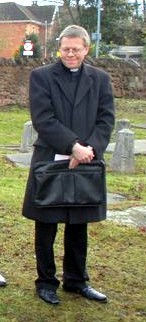
The vicar of St. Mary's, the Reverend Charles Chadwick then offered a prayer
Some notes from the Prayer
We remember a man of humble beginnings, who through his good qualities and good works, accomplished success and prosperity. But he was keen to share his success with people of every description. He was charitable and keen that others could share in the spoils of his endeavours.
Cook was a keen gardener. Although we have no idea of what it looked like, we can be sure that if he devoted to it the same ethic he did to his professional and civic life we can be sure it would have been one of the most beautiful in the county.
We remember a man of inherently good nature, kind, charitable, hard working and public spirited. He was a lifelong Anglican and the qualities we can see he expressed show that he was a good man and a good Christian. He believed in what he was doing and his sheer range of good works show that he never hesitated in doing the right thing.
He was a lawyer with a conscience, a public servant with no personal agenda. He wanted to improve, to educate, to care, to provide, to above all set right and make good. We can be sure that Cook left the world a better place than he entered it. We can be sure he rests at peace, having done all that he could in the time he was given.
Mr Alan Hurford, the Town Clerk of Bridgwater then laid a wreath upon the memorial to his civic predecessor and a moments silence was observed.
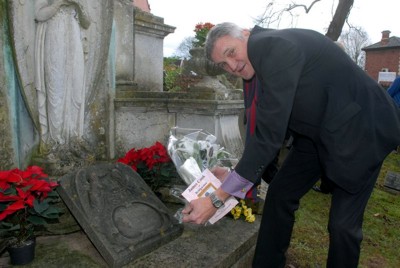
Mr. Hurford then gave a short speech about the honour of the occasion and how Cook's journey from Bridgwater to Weston-super-Mare was the opposite he himself had made, formally serving for Weston-super-Mare Borough Council, before becoming Town Clerk of Bridgwater.
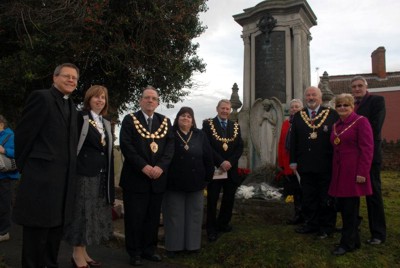
Thereafter the Mayor of Taunton, Cllr. Steve Brooks said a few words. As a child he had lived across the road from the Cemetery and had often admired the grand memorial and the overgrown forbidding graveyard. Gratitude was then expressed to the sterling work of the Friends in their efforts in tidying up the site over the preceding year.
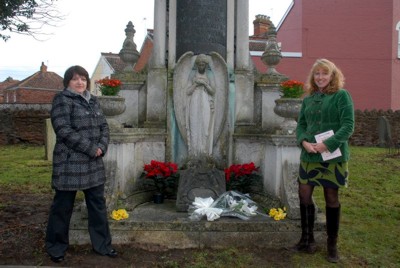
Derek Gibson, President of the Bridgwater and District Civic Society, a former architect whose predecessor had designed the structure, remarked upon the national importance of the listed memorial and its importance to the built heritage of Bridgwater.
Finally the chairman of the Friends thanked everyone for coming. Those gathered then retired to St. Mary's Church for tea and biscuits.
